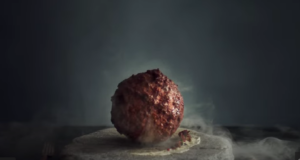Remember what happened when they brought dinosaurs back to Jurassic Park? In an eerily similar twist, the Australian company Vow revealed their newest project — the Mammoth meatball today. But, the creators won’t be trying it quite yet … and Italy might not be either.
The meatball, revealed at the Nemo Science Museum in the Netherlands wasn’t actually engineered for eating. Vow explains that they don’t really know what effect mammoth proteins might have on the human body and that the experience was really more of a publicity stunt.
The kicker is that while the meatball does contain mammoth DNA, gaps had to be filled by African elephant myoglobin sequences that were then inserted into sheep cells.

While Vow was playing around with lab-grown meat, Italy’s Council of Ministers has been discussing a draft law introduced by Giorgia Meloni’s administration banning lab-produced meat in food and animal feed. The ban comes along with a fine of up to 60,000 euros (or about $65,000) for any violations.
According to Reuters, the bill aims to safeguard the country’s agri-food heritage by forbidding the Italian industry from using cell cultures or tissues derived by vertebrate animals in food and animal feeds.
This isn’t the first decree by Meloni’s administration — last week, the NY Times shared that the government was preparing decrees to introduce labels for products that contained or were made from insects.
While some news sources share that the ban would put Italy “behind the times” in Europe, BNN reports that France, Spain, and Germany are in the process of regulating the production and sale of lab-grown meats.
Although cellular meat is not yet widely available to consumers, proponents believe that cellular agriculture could reduce land, water, greenhouse gas emissions, and eliminate the needs to raise and slaughter animals for food.


